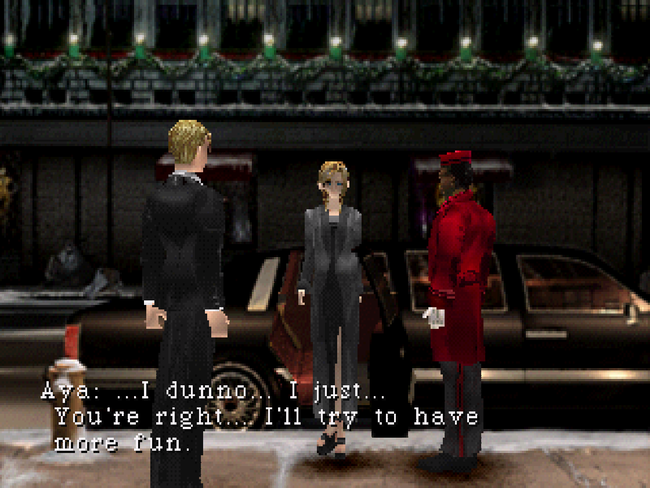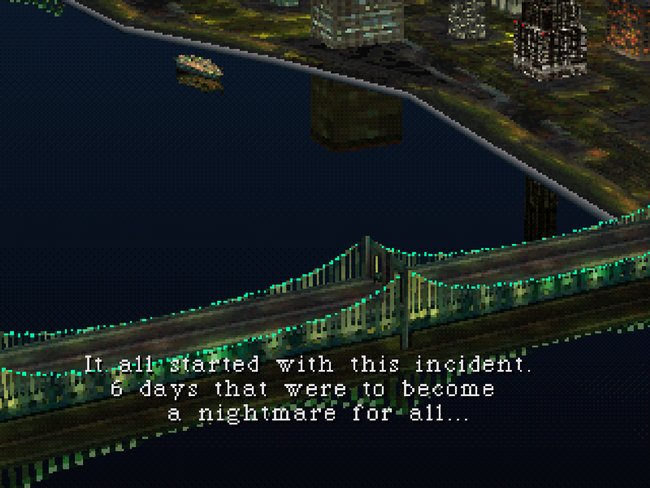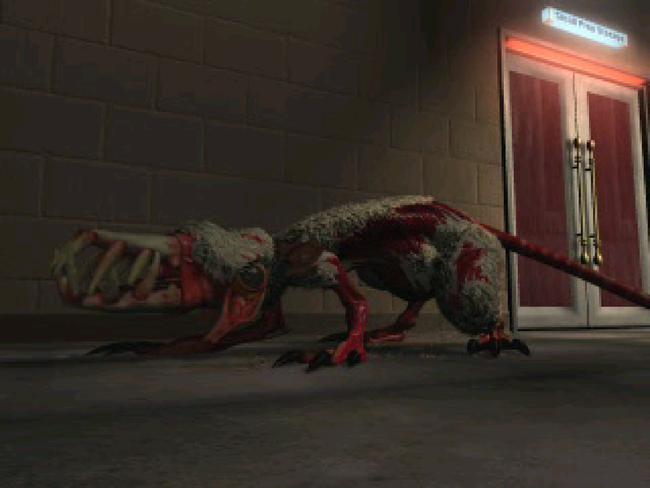
Parasite Eve is my Christmas classic
Most of us have traditions to mark the holiday season - watching a certain film, indulging in a family recipe, an annual trip to see The Nutcracker, or even just biding our time until January rolls around and the holiday cheer is packed away until next year. For me, the holiday season can be a hectic one. After family visits and Christmas dinners, plugging away at an old favorite game on the couch underneath the glow of the tree is a great way to decompress. Parasite Eve is an annual favorite of mine, the sci-fi body horror splashing buckets of mitochondrial ooze all across the big apple. It’s a great palate cleanser after one too many holiday sweets, and a reminder that for many, the holidays can be hell.
Released in 1998, Parasite Eve takes place over the course of a week in New York City beginning on Christmas Eve. Players assume the role of Aya Brea, a steely member of the NYPD who seems somewhat reluctant to be on a date to the opera. Minutes into the performance, however, and all hell seemingly breaks loose when the cast, crew, and audience spontaneously combust. Aya’s date bolts from the theater, leaving her behind. Rather than flee herself, she delves backstage to investigate. When she comes across a rat, it viciously transforms, its body splitting open and growing monstrously large.

Aya defeats it and, after coming across a charred corpse or two, encounters Melissa, the opera singer. She transforms into a grotesque vision of a monstrous woman, calling herself Eve, controlling and consuming Melissa’s body through the use of her rogue mitochondria. It’s bonkers pseudoscience that had me deeply enthralled as a tween - so much so I sought out the Japanese book and film that inspire the game, however loosely. It also set me up to devour the game’s direct sequel, Parasite Eve II, a few years later and even check out the series’ spiritual successor in The Third Birthday.
Over the course of the next week - the game is broken up into six days - Aya is subject to demonic looking survival horror critters - giant rats, enormous alligators, mutant crabs, you name it, you probably have it somewhere here. Don’t worry, there is even a T-Rex and demon fetus to fight before the credits roll. Aya squares up against bigger and nastier creature features while trying to come to terms with something far scarier: her unresolved trauma. The story is absolutely wild, and not all of it works, but the game swings for the fences, completely proud of how convoluted the narrative becomes by the end.
Throughout the week, Aya is mostly alone - she’s the only one who is genetically impervious to Eve’s mitochondrial powers, making her all but the only person who can reliably get within striking distance of Eve or her mutant army. This genetic gift is also the explanation of Aya’s “Parasite Energy” powers, the game’s version of magic. It may be Christmas in NYC in 1997, but this New York City is markedly empty. Everyone else has either evacuated or reduced into a pile of primordial ooze. It underscores the idea that, even with Aya’s handful of friends and allies, she can only rely on herself. She is surrounded by horror, and it seems there is only one person who understands the source of Aya’s strange abilities - Eve.

Throughout her quest, Aya visits a handful of iconic NYC landmarks - Central Park, Rockefeller Plaza, Statue of Liberty,, and more. Yet each scene is quieter and emptier than the last. There’s no joy in Central Park this Christmas, just silence and loneliness. This desolation is everywhere in Parasite Eve, and in the lives of its characters even before the fateful opera performance. Aya is alone, haunted by memories of her long-dead sister. Her partner is a recent divorcee struggling with single fatherhood. Melissa herself risks her physical health for a role she is convinced will bring her meaning - even if it kills her.
This bleakness permeates the game, outside of the bombastic set pieces and giant monsters. You can feel it in the cutscenes, the masterfully composed soundtrack, and even in combat where Aya - alone - frequently faces odds that are stacked against her. Combat uses a version of the Active Turn Battle system from Final Fantasy, with an action oriented slant. Aya is free to move around the combat zone to position herself to evade enemy attacks. When the ATB meter fills, players can use items, Parasite Energy abilities, or attack. Aya is able to heal, buff and debuff, attack, and do more with her psychic energy. When players choose to strike, a sphere-like grid surrounds her indicating the range of her weapon. Combat is finicky, especially in closer quarters, but fun.
Aya has a number of gun types to use, including handguns, rifles, and rocket launchers all at her disposal, so long as she has enough rounds of ammo. Players can utilize “tools” to mix and match elements and other weapon attributes, as well as allocate bonus points for additional boosts to certain stats or inventory size. It’s a nice touch of customization that opens up the game, especially when attempting the daunting Chrysler Tower in the game’s EX mode, which is basically the game’s version of New Game + and features the game's “true” final boss and ending.

The atmosphere is enhanced by Yoko Shimomura’s soundtrack, blending electronic grit and urban vibes to elevate the game’s moodiness. The score weaves between genres and influences, with high-octane rock sections in some sequences complemented by the game’s pulsing beats during the main combat theme. It’s some excellent, varied work, with the electronica styled tracks standing out, twenty five years later.
It certainly sounds like Aya Brea is having a poor holiday - and let’s face it, maybe she is. Isn’t it something most people can probably relate to? Plenty of people have complex feelings about the holiday season, because of family issues, memories of loss or grief, or even a general distaste for the holidays. After all, not everyone is living a life out of a Hallmark movie - some are just trying to make it through the day, even more so during the holidays. Aya Brea is just trying to survive - forget about thriving - when her world is upended one night that happens to be Christmas Eve.

For me, that’s one of the reasons why Parasite Eve is such a great holiday palate cleanser. Its story and setting are Christmas-oriented enough to make it feel seasonally related without being too on the nose. After all, I am not trying to watch a movie or play a game about a murderous Santa Claus. The taut runtime makes it a perfect game to unwind with on the couch after the kids have gone to sleep and you’ve finished wrapping the presents. While the story might devolve into nonsense, its foreboding atmosphere and broken characters make it go down easy.
It’s chaotic, messy, and frantic - just like me at the end of the holiday season. The difference being that at the end of the day or season, I get to take a deep breath and relax, maybe even play a game or two while waiting for Santa to make his stop. When it gets too much, I can always remember that schedules and life will be back to normal in just another handful of days. Aya Brea, on the other hand, is about to have one hell of a Christmas. I wouldn’t have it any other way.